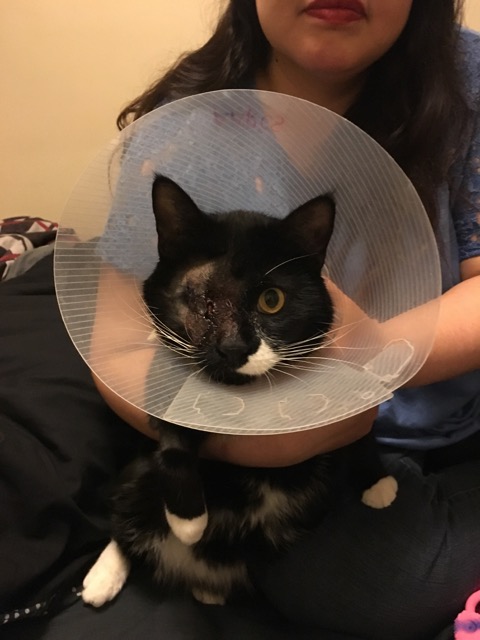Sonny, the senior domestic vermin, has at length recovered from his recent surgery. He developed an ulcerated eye with a promptness and celerity that does our Division of Infectious Plagues credit. In the span of a few days he went from a mild case of pink eye to having his cornea rupture, whereupon aqueous humour leaked out all over, and there was nothing for it but to remove the eye – at great expense to my Vile Human, who could ill afford it, but was too much of a sap to simply dispose of the beast.
The vermin is now fully recovered, except for being minus an eye, and has completed his sentence – a fortnight in the Cone of Shame:
He is serving our purposes tolerably well. During his convalescence, he had to be separated from the junior vermin, which meant keeping him in the humans’ sleeping quarters, where he kept them awake o’ nights. Since his recovery, he has been unsociable and aloof (except to the other vermin), no doubt because he has come to associate human contact with the evil fate of being taken to the vet.
We have also made arrangements to tax the humans’ patience with minor illnesses. First we got the Vile Human to contract a bad head cold, which in due time migrated south and became a chest cold; and just as he was recovering, we made sure that he transmitted it to his mate. Along with the chronic complaints – degenerated spines, pernickety feet, things of that nature – this has produced a satisfactory feeling of irritability and despondence, in which very little of value has been accomplished.
One knows, of course, that neither the Vile Human nor his mate were ever liable to accomplish anything of much value in any case; but, my poppets, in our business we can never be too sure. Better to remove the humans from the path of temptation by making it virtually impossible for them to do anything at all. Here endeth the lesson; go, ye, and do likewise.
(Signed)
H. Smiggy McStudge
cataplasm |ˈkætəplæz(ə)m |
noun archaic
a plaster or poultice.
Middle English: from Old French cataplasme or late Latin cataplasma, from Greek kataplasma, from kataplassein ‘plaster over’.








You know, I don’t like to speak ill of someone I’ve never actually met, but one might almost suspect that this Mr. McStudge is no gentleman. His opinions certainly do not strike me as particularly cricket.
Perhaps a genteel disdain is called for. Or maybe not so genteel — I was recently reading about a large group of new trainees specializing in the eviction of unwelcome guests of Mr. McStudge’s sort.
How horrid for all of you. I’m glad it is in the past, more or less.
Off topic and celebrating the day: A “lost” “Chesterton” essay